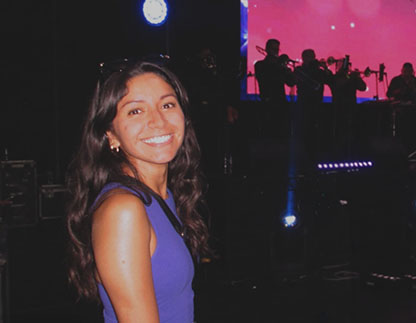I never thought that my research would take me back home—nor that it would be full of personal discovery—but I wouldn't have it any other way!”
Valeria Chávez Roncal
PhD Candidate in the Department of Musicology

Valeria Chávez Roncal is a PhD candidate in the Department of Musicology in the Bienen School of Music. Her ethnographic research centers on the contemporary commercialization and institutionalization of Peruvian cumbia music. Her other research interests include intersections of music and movement, namely the collaborative works of 20th century American composer and choreographer John Cage and Merce Cunningham. Valeria has presented her work at Midwest Chapter Meetings of the American Musicological Society (AMS) and will present it at the upcoming Latin American Studies Association (LASA) Congress in June.
How would you describe your research and/or work to a non-academic audience?
My research follows the contemporary reassessment of Peruvian cumbia musics and its intersection with official and unofficial narratives of nationalism. As my close friend and interlocutor once commented, cumbia music is the most ordinary thing in Peru. The genre hit its peak in the late twentieth century, but this highly ethnicized and classed musical genre was consequently excluded from elite commercial spheres and institutional cultural politics.
My dissertation examines how both commercial and cultural institutions have recast cumbia music as a cosmopolitan musical form and sonic symbol of Peruvian identity. I work with musicians, record label managers, record collectors, museum curators, music journalists, and other public facing scholars to better understand cumbia music and its many sociocultural functions in the Peruvian soundscape.
What have been some of the most memorable twists and turns of your career?
I actually came into Northwestern wanting to study twentieth century Russian ballet music. I pivoted toward Peruvian cumbia music almost accidentally, but I was amazed at how much I loved ethnographic research and working with other Latin American music scholars. I'm from Peru and most of my family still lives there, so I've visited plenty of times, but my first research trip was still full of surprises. I never thought that my research would take me back home—nor that it would be full of personal discovery—but I wouldn't have it any other way!
Tell us what inspired your research and/or work.
I initially struggled to explain what exactly motivated the change in my research interests, but I realized that cumbia music is a really useful vehicle for studying many aspects of Peruvian society. Cumbia performance is inextricable from dynamics of race and ethnicity, class relations, the (often controversial) role of institutional cultural politics, competing notions of nationalism, local humor, and more. There is something so quintessentially Peruvian about its sound and its performance practices, and that special "something" keeps me pushing forward.
What do you find both rewarding and challenging about your research and/or work?
My research has connected me to some truly fascinating individuals, and the opportunity to speak with so many different people is one of the most rewarding parts of the work. I learn so much from every interaction, however formalized or brief, and this really enlivens the research. I'm honored that people are so willing to share their experiences and perspectives with me, but this also brings about the challenge of balancing various stories that often compete and conflict with one another. I'm finding that embracing these dissonances often yields a far more nuanced story than trying to create a linear narrative.
Why Northwestern?
I came into Northwestern with too many interests to count, so I was attracted by the University's emphasis on interdisciplinary collaboration. I've been able to take courses in anthropology, history, music performance, and musicology, to name a few, and these experiences have been invaluable for my work. There is a real aura of curiosity around here, and it's lovely to be around.
How do you unwind after a long day?
I'm someone who needs to move to think, so any type of exercise really keeps me grounded! I'm especially fond of group fitness classes, and I've been practicing yoga for almost a decade. The sense of community formed in these spaces is really special. I like to think that no matter where we all came from or where we head after the workout, we've all made the common decision to dedicate time to intentional movement—and I find that to be really fulfilling. I've always been tempted to research the function of music in group fitness settings, but I'll save that project for another time!
What advice would you give your younger self or someone considering a similar path?
Finding what lights your fire can be a long process of elimination, and that's okay! Realizing what you do not like is just as important as finding what you do like, and every experience can be a learning opportunity. Allowing yourself time to recharge is also productive, even if it doesn't always feel that way.
What are you most proud of in your career to date?
The ability to keep moving forward! My time at Northwestern has been filled with many "firsts," and though scary at the time, these moments have propelled lots of personal and professional growth. I've learned to embrace the unfamiliar and uncomfortable path, and I'm proud of the perseverance I've developed along the way.
Publish Date: April 2, 2024
If you know a graduate student, postdoctoral scholar, graduate faculty member, staff member, or a member of our TGS alumni population who would make a great candidate for our TGS Spotlight Series, please complete this brief TGS Spotlight Series Nomination Form.